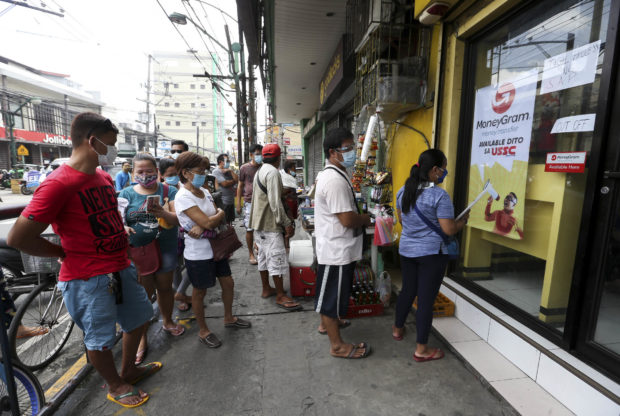
SUBSIDY Beneficiaries of the government’s cash aid wait for their turn to claim their money from a remittance center in Tondo, Manila. INQUIRER file photo / LYN RILLON
MANILA, Philippines — More than 450,000 beneficiaries have received financial subsidies under the Bayanihan to Recover As One Act (Bayanihan 2), the Department of Social Welfare and Development (DSWD) reported Monday.
During the meeting of the House committee on social services, DSWD Undersecretary Aimee Torrefranca-Neri said as of January 22 this year, 452,340 beneficiaries of its emergency subsidy program have been provided the P5,000 to P8,000 one-time cash grant to help them cushion the impact of the coronavirus pandemic.
Of the number of beneficiaries served, 73,307 came from areas placed under granular lockdown while 379,033 are considered as additional beneficiaries.
According to DSWD’s report, the emergency subsidy program targets to cover 92,735 beneficiaries in areas placed under granular lockdown. This means the agency has so far served 79% of its target beneficiaries in these areas.
Meanwhile, DSWD has served 68 percent of its target beneficiaries that fall under the category of “additional beneficiaries.”
The emergency subsidy covers low-income family beneficiaries who are physically residing in areas placed under granular lockdown from the date of effectivity of the Bayanihan 2 on September 14, 2020.
It also covers families of recently returned overseas Filipino workers (OFWs) who were undocumented and were not provided assistance from other government agencies.
Also covered are qualified low-income family beneficiaries who were not provided with the subsidy from the social amelioration program under Bayanihan 1, but were deemed eligible.
Neri explained that the agency encountered several challenges in its provision of assistance to those affected by the pandemic.
Some of these challenges include the lack of an updated database on the part of the national government and local government units, weather conditions that postponed payouts, and Covid-19 cases that compelled implementers to undergo quarantine, among others.